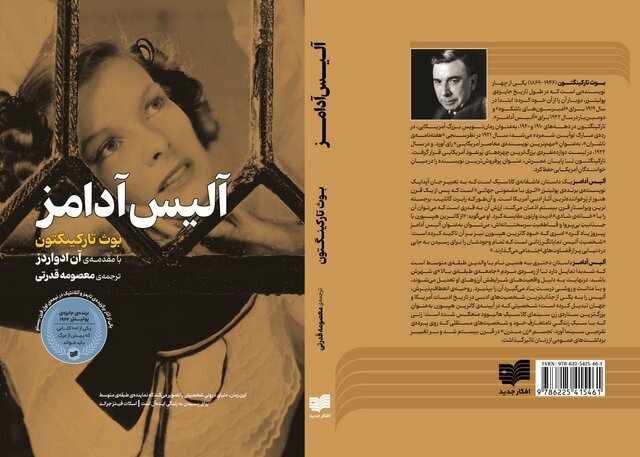Booth Tarkington’s “Alice Adams” published in Persian

TEHRAN-The Persian translation of the 1921 novel “Alice Adams” by Booth Tarkington has been released in the Iranian book market.
Masoumeh Ghodrati has translated the book and Afkar-e Jadid Publication has brought it out in 300 pages, ISNA reported.
The book received the 1922 Pulitzer Prize. It was adapted as a film in 1923 by Rowland V. Lee and more famously in 1935 by George Stevens.
The narrative centers on the character of a young woman (the eponymous Alice Adams) who aspires to climb the social ladder and win the affections of a wealthy young man named Arthur Russell. The story is set in a lower-middle-class household in an unnamed town in the Midwest shortly after World War I.
Alice Adams wants desperately to belong with the people of “high society” who live in her town. Ultimately, her ambitions are tempered by the realities of her situation, which she learns to accept with grace and style. Alice's resiliency of spirit makes her one of Booth Tarkington's most compelling characters.
The novel explores themes of social class, identity, and the pursuit of personal success in post-World War I America. Reflecting on the American myth of success, Alice's journey echoes the experiences of characters like Jay Gatsby, as she engages in deception to project an upper-class identity to Arthur Russell, a wealthy suitor.
As Alice navigates her family's financial decline and her own ethical dilemmas, the narrative critiques the societal pressures that equate identity with material wealth. Tarkington portrays Alice's transformation from a romantic idealist to a more grounded realist, culminating in her decision to seek employment and embrace her true social position.
The novel intricately weaves the lives of its characters, including Alice's ethically challenged father and her troubled brother, to highlight the complexities of class dynamics and personal integrity.
Booth Tarkington (1869-1946) was an American novelist and dramatist. He is one of only four novelists to win the Pulitzer Prize for Fiction more than once, along with William Faulkner, John Updike, and Colson Whitehead. In the 1910s and 1920s, he was considered the United States' greatest living author. Several of his stories were adapted to film.
During the first quarter of the 20th century, Tarkington, along with Meredith Nicholson, George Ade, and James Whitcomb Riley, helped to create a Golden Age of literature in Indiana.
He is often cited as an example of an author who enjoyed great success when alive, but whose reputation and influence did not survive his death.
SS/
Leave a Comment